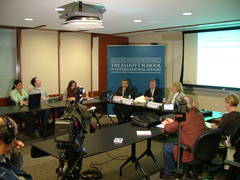Thursday, November 27, 2008 - 00:00
United States

On November 24, 2008, the Institute for European, Russian, and Eurasian Studies (IERES) of the Elliott School of International Affairs at the George Washington University hosted an event titled “The South Caucasus: A Year of Ballots and Bullets.” Organized jointly with the Policy Forum Armenia (PFA), the event featured PFA’s report on February 19, 2008 presidential election in Armenia. The Report is an attempt to look at the multifaceted aspects of the election and post-election developments in Armenia with an aim of presenting an independent assessment of what transpired. The event was well attended, with over 50 Washington-area academics, policy practitioners, and graduate students in attendance, and was chaired by Professor Hope Harrison, Director of IERES.
In his opening remarks, before turning to the PFA Election Report, Dr. Asbed Kotchikian (PFA Senior Fellow and a lecturer of political science at Bentley University, Boston), discussed the realignment of regional politics in the South Caucasus vis-à-vis Russia by emphasizing the post election political dynamics in Azerbaijan, Russia, and Armenia. The speaker dwelled on the Georgian-Russian relations after the conflict over South Ossetia and how the conflict had an impact on Georgia's domestic and foreign political processes. He argued that since Putin came to power in Russia, Moscow has pursued a more active policy of reestablishing itself as a regional power with a lot of interest in its near abroad. Furthermore the fact that many politicians in Armenia made statements regarding the role of Russia in a post-election period was an indicator the of extent of Russia's importance in domestic political processes in Armenia.
Dr. Kotchikian brought up PFA Election Report in the context of the growing role of the civil society in the Caucasus, particularly in Armenia. He mentioned that PFA began collecting information about the election and post-election developments in Armenia just as those were unfolding. A lot of the information and data collected in the days following the election subsequently found their place in the Report.
The Report is built on three critical chapters. Chapter III lays out evidence of misuse of administrative resources, vote buying, voter intimidation, and other examples of abuse of power to secure a specific outcome. Chapter IV zooms in on ballot stuffing and artificial augmentation of vote counts and presents ample statistical evidence indicative of the presence of these two types of manipulations. The election outcome also sheds some light on the extent of the post-election dissatisfaction and disaffection of a sizable portion of Armenia’s population. Finally, while reviewing the developments pertaining to the civil society, Chapter V argues that Armenia is critically positioned with a strong and empowered civil society and a determination to realize meaningful change on a national scale.
The second speaker was Christopher Kojm, a Professor of International Affairs Practice at the Elliott School and the former Deputy Executive Director of the 9/11 Commission. He spoke about his experience with traveling to Armenia in October 2008 as part of a delegation to share the experiences of the 9/11 investigation with an Armenian parliamentary commission looking into violence and deaths during the suppression of demonstrations on March 1-2. Professor Kojm’s started off his presentation by putting those events in the context for attendees:
“On that night, 10 people were killed, 100s were injured, and over 70 of those arrested still remain in prison, in a country of 3 million. To translate that into the American context, it would be a thousand killed, over ten thousand injured, and seven thousand imprisoned. Naturally, had that occurred in our country, this would have been a topic of discussion and the American people would like to know what happened on that night. Who is responsible? Tell us the facts so that our country can deal with them and move forward.”
In his subsequent remarks, Professor Kojm discussed the factors necessary to produce a credible investigation and a credible report. First, he stressed the importance of participation of professional staff, including with experience in forensics, as well as access to documents, participants, and witnesses. In his view, lack of professional staff attached to the ongoing parliamentary investigation rendered the process less effective. Furthermore, members of the parliamentary commission themselves faced sparse access to documents and records, which represents a serious shortcoming for the process. Second, he emphasized that a credible report on a national tragedy requires participation of a broad spectrum of a country’s political leaders in the conduct of the investigation. The current parliamentary commission is hampered in this respect, he said.
Professor Kojm ended his presentation on a note similar to the conclusions offered in the PFA’s Election Report. He noted that the challenge before all Armenians is to build trust across opposition political boundaries and complete the story by revealing the truth of what happened on the night of March 1-2. “And if you tell people what happened, you can help heal the nation and move forward.”
The presentations were followed by an active question-and-answer session. More pictures from the seminar are available in Photo Gallery.
